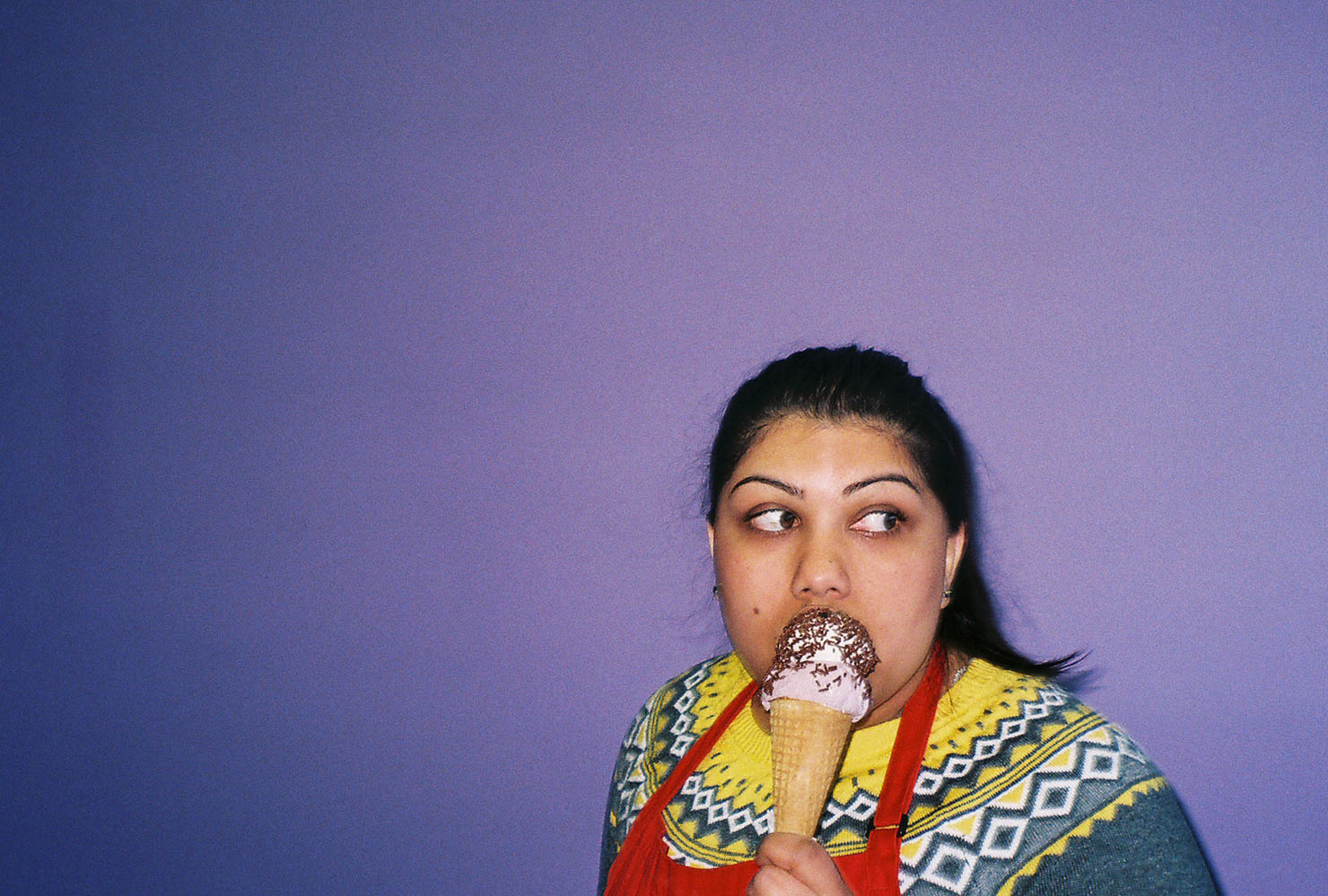
As Komal Das, the co-owner of Das’ Creamery, will tell you, the best flavor is a balanced one. At her independent ice cream shop in New Jersey, Komal balances soft serve with a tough ‘tude, making her a totally boss babe.
A week ago, I was lucky enough to lounge around in Komal’s bright purple store in Budd Lake, sampling delicious, handmade flavors Komal and her dad, Pankaj Das, have dreamed into life. We had Eggnog, Cinderella’s Ride (a spicy pumpkin number), For the Sage of Maple (with organic sage and candied walnuts), Cranberry Thyme, and Chocolate Peppermint. I was surrounded by buckets of ice cream, ice cream cakes, ice cream pies, and ice cream sandwiches. In Das’ Creamery, you’re basically caught in the middle of a chocolate-and-vanilla swirl, and it feels so damn good.
Komal and I have been friends since high school (if not before that), and as we’ve grown, she’s become one of the most hilarious, fun-loving, yet dedicated and hard-working people I know. She combines all the sass of the best “what’s this bullshit now?” look I’ve ever seen with the sweetness of one of the world’s most infectious giggles. Komal’s able to exude calm, levity, and excitement almost all at once. It’s that incredible concoction of energy that’s fueling Das’ Creamery, driving Komal to attack owning a business with all of her attitude even without formal schooling.
Of course, Komal is extremely well-trained and creative in the kitchen, and it’s that culinary background that makes her flavor combinations truly unique. If the fall flavors list wasn’t enough to make you drool, there’s more goodness on the horizon when the store re-opens in late January after their brief hiatus (which starts on December 22).
“Around this time, we start thinking about Valentine’s Day and St Patrick’s Day,” she explained. “We make Rose ice cream with real roses. We do a Chocolate Stout ice cream, and that one is a huge, enormous best-seller, super-smash hit. There’s booze in it, so people love it!” Yes, I’m adding that to my must-eat calendar right now.
Join Komal and I as we scream for ice cream, dig into what it takes to start a business and work with your family, and dream about what’s next for the mighty Das’ Creamery empire.
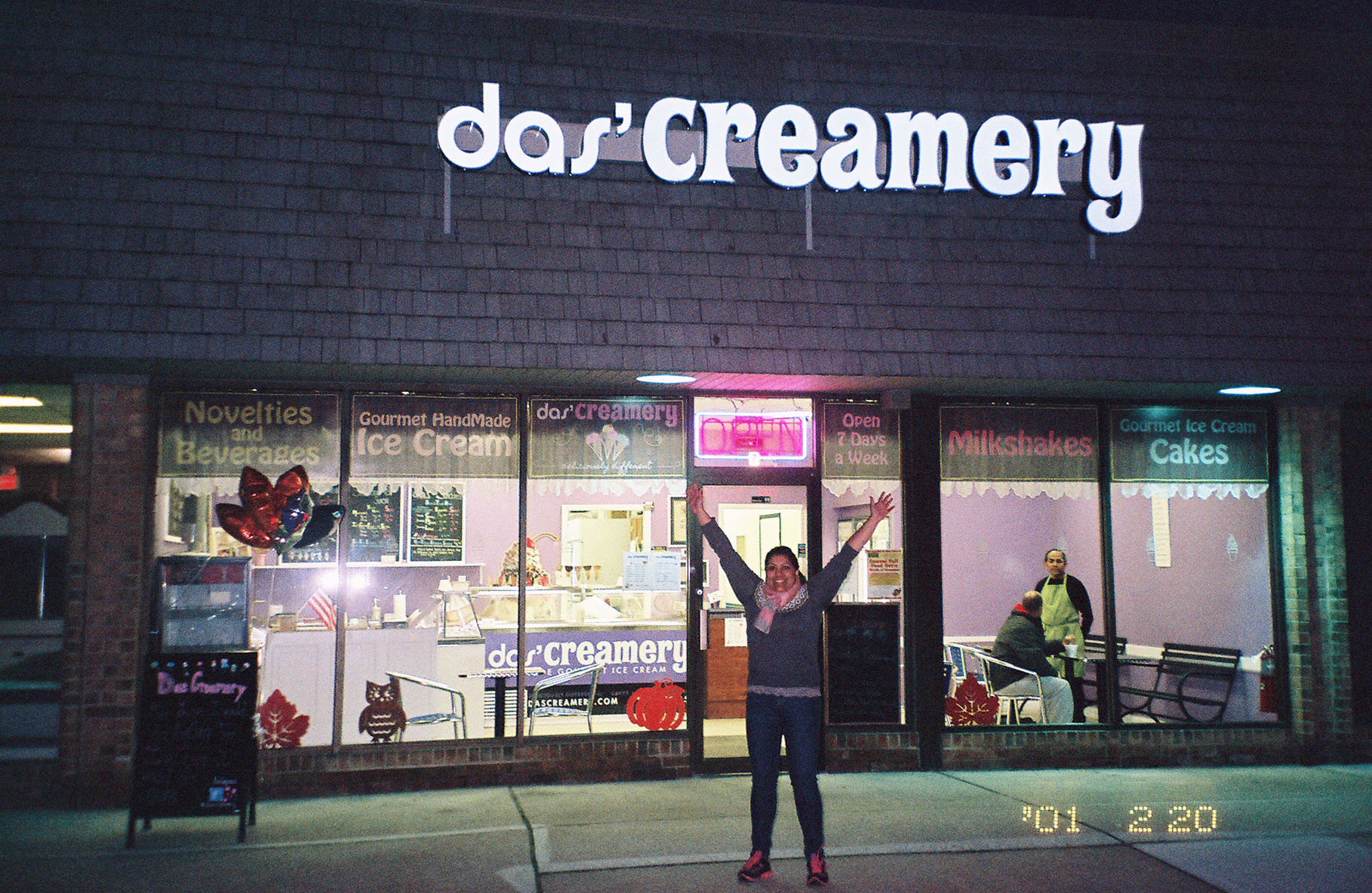
What first brought you to culinary school? What was that like?
I like to cook and entertain. I realized while I was going to Rutgers and cooking for my roommates that it’s kind of always been like that. At the same time, I figured out that college wasn’t right for me. It’s not right for everyone. Some people go to grad school and become professional students, other people just want to get their hands dirty. That’s what I decided to do. I didn’t finish Rutgers and made the jump to the French Culinary Institute in Manhattan. It was an intense program. You were just cooking, nine hours a day, for six months. I towed around a knife bag with, like, eleven knives in it every day. [Laughs] I felt pretty safe on the subway.
The French Culinary Institute does not waste any time. They tell you how it is. It’s not a glamorous job working in the kitchen. It’s sweaty. Some of the characters you meet in the back of the house are pretty rough. You’re on your feet anywhere from nine to 13 hours, and if you’re working a double, expect 16 hours on your feet. It’s not what you see on TV, that’s for damn sure. [Laughs] Hopefully you don’t want to be Paula Dean, but if you want to be Giada or something like that, it’s not like that. Perfect makeup, manicured nails—that’s not realistic.
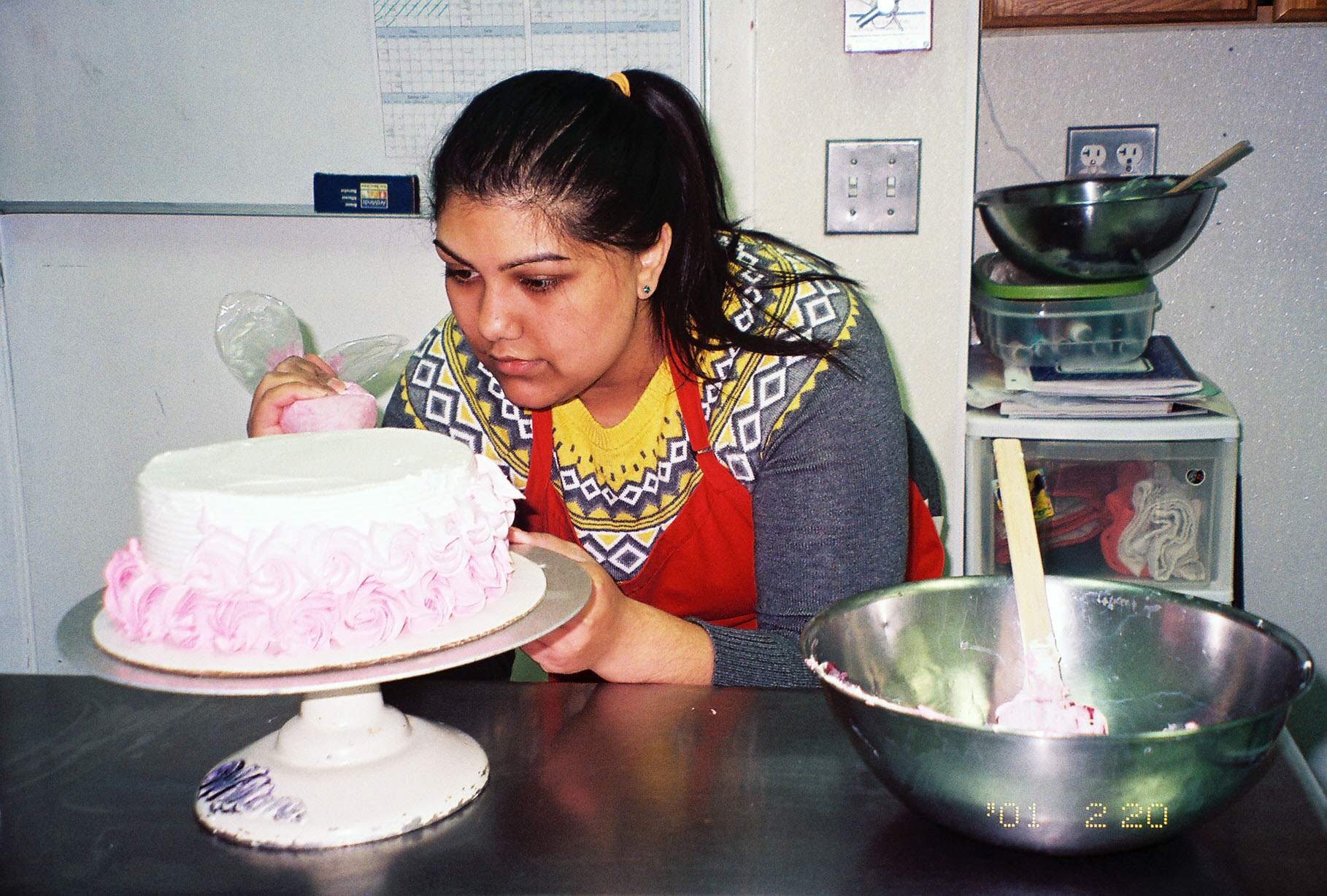
What other restaurant jobs did you hold before opening up the shop?
My first job out of culinary school was at a restaurant on the Upper West Side called Telepan. Super high-end fine dining. I was only there for a year and a half, but I learned a lot. I saw a lot of things. Cooked for a lot of famous people. And it was the most amazing group of people I’ve ever worked with. They were like my brothers. A few of them have been here, like, they’ve taken a bus or rented a car from Manhattan to see the ice cream shop. It’s really nice that they’re supportive, and we still keep in touch. But that job was all sautéing and fresh pastas and meat and stuff. There was never an inkling of, “Oh, do you want to learn to make ice cream?”
I lived in New York for two years, and then I moved to Atlanta. I took a cooking position there in a brand new restaurant as a junior sous chef. I was also the only woman in the entire kitchen, so they did not make me a proper sous chef, but I was in charge of 24 dishes and five employees, so I was a goddamn sous chef. [Laughs] I was only at that place for, like, four months because management was really bad, and I felt like I wasn’t treated as respectfully as I should have been. I learned a lot about what not to do from a management position there. Like, “This is how you don’t encourage your employees to be their best.” [Laughs]
After that, I took a month off and just hung out in Atlanta. By then, my dad was retired. He was like, “We should really open an ice cream shop.” He’d seen some places, including this location. This spot was great because it’s been an ice cream shop for awhile. Before us, it was an independent frozen dessert place, and before them, it was Dairy Queen. The power of brand name really goes a long way. Even five years later, people still come here looking for Dairy Queen, and we’re like, “Oh, we’re not Dairy Cream, BUT WE DO HAVE ICE CREAM!” [Laughs]
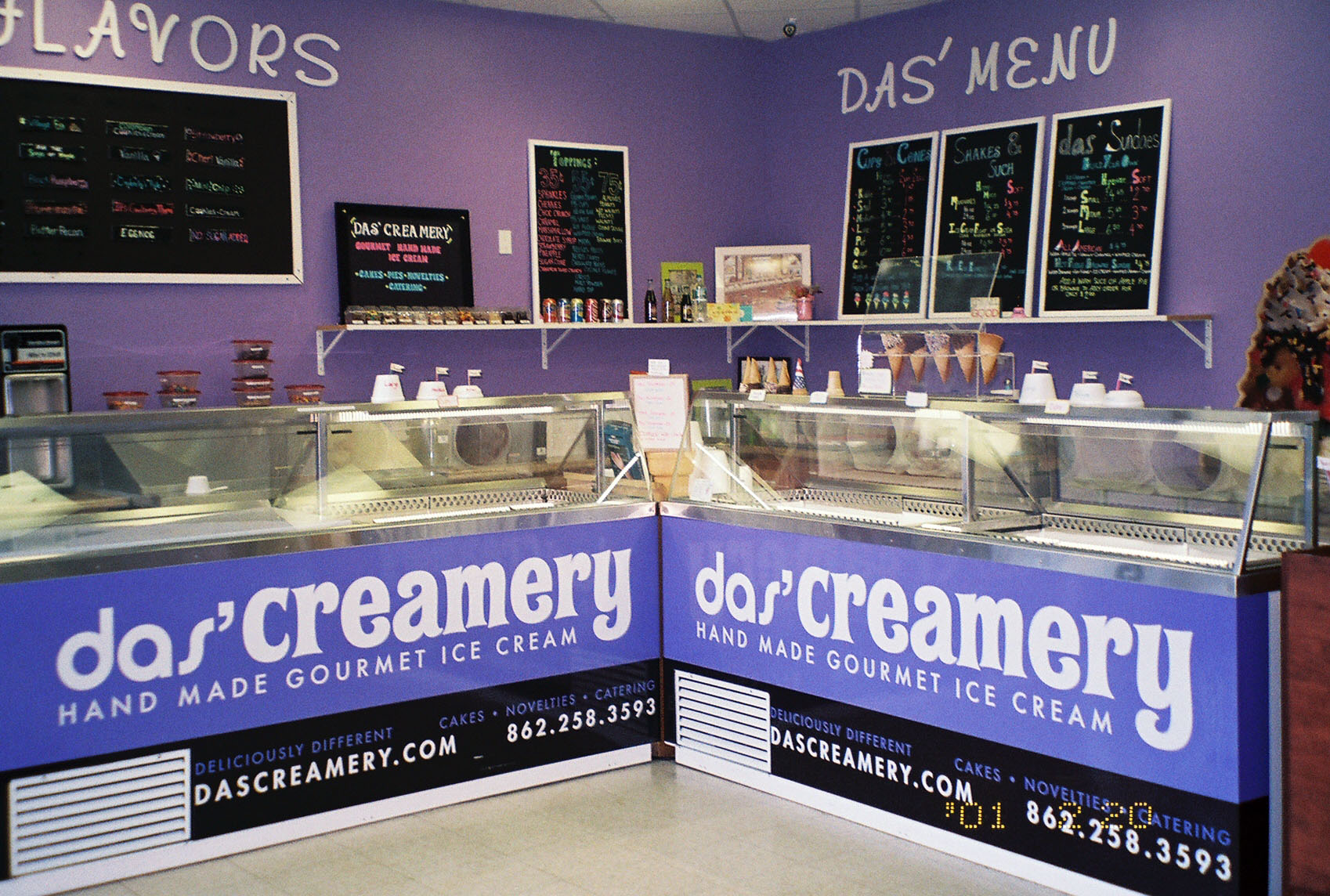
What else led you two to decide to open an ice cream shop, other than prime real estate?
My dad and I always wanted to do something with my culinary background and our family’s love for food. When we found out about this spot, it was just perfect. My lease was ending in Atlanta, and I was sort of running out of ideas of what to do there. We just decided to go for it. Things felt good. We felt like we could take on the challenge, and it wouldn’t be too overwhelming. Although, now that we’ve done it for over a year, I have to say that if you don’t have the drive to work 100 hours a week and miss your friends and not get paid, opening a business isn’t for you. But it seemed like a good time in my life, at my age, to start building something for myself that will turn into a career and last forever. It’s something I could pass on to the next generation, too.
And of course, everyone loves ice cream. [Laughs]
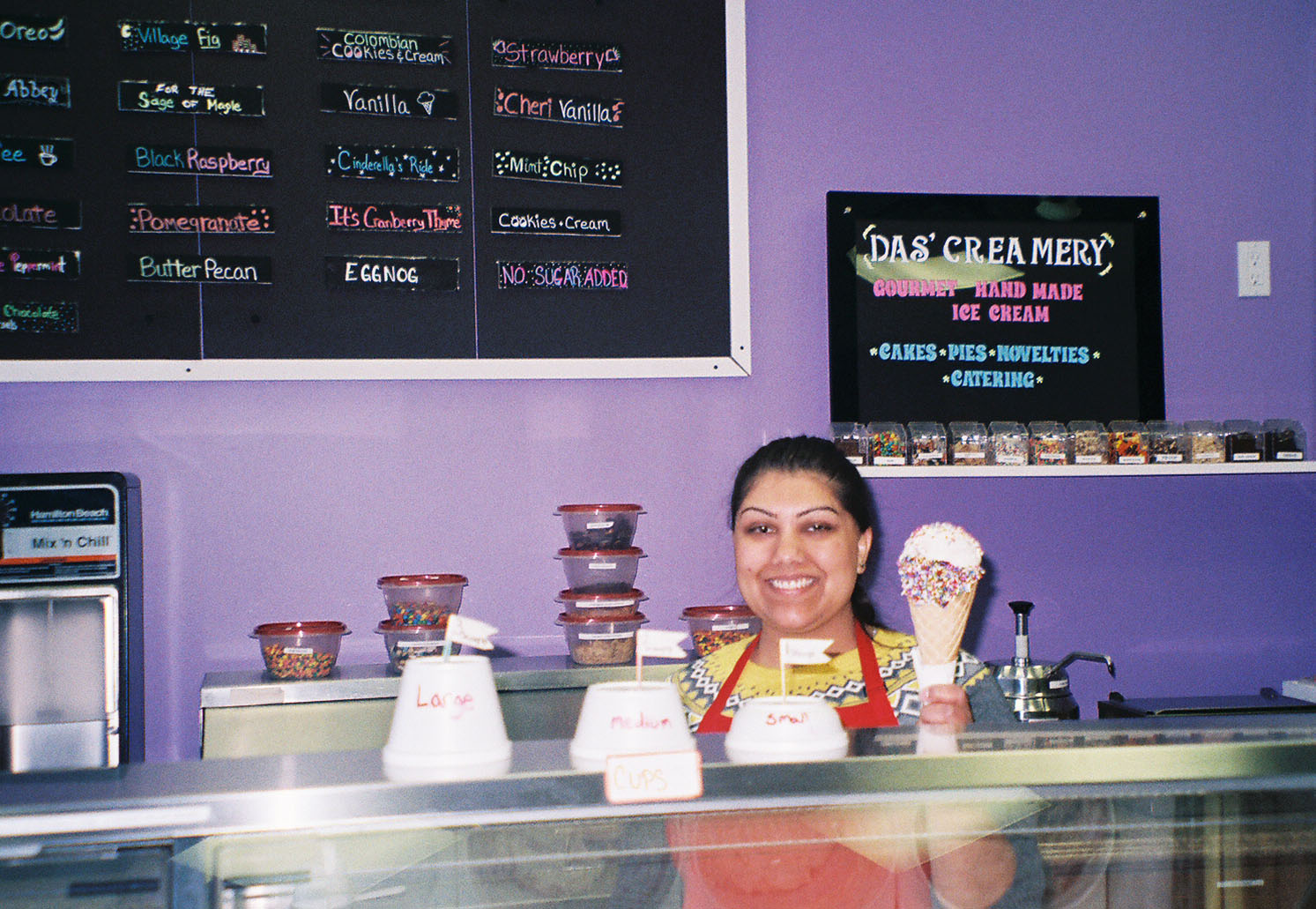
With your culinary background, did you still have to learn about how to make ice cream? I’m imaging some kind of killer ice cream training montage.
In culinary school I didn’t learn anything about ice cream, but I did go to an ice cream technology course at Penn State, which is what Ben & Jerry did when they were getting their start. It’s so scientific. It’s something I never thought I’d have to worry about—chemistry and keeping all of the ingredients balanced. For example, if you’re making our Eggnog or Chocolate Stout ice cream, if you dump in a whole bunch of alcohol, suddenly it’s not going to freeze the way it should. It’s like when you try to replace the vodka in your dad’s bottle with water, and then it freezes all weird. [Laughs] We’ve all done that stupid move. It’s the same with sugar or adding a bunch of fresh fruit—it makes your ice cream softer and it won’t hold up on a cone unless you balance that out. So those are the kind of things you learn in class, and then of course you learn them again through trial and error when you’re actually making the ice cream. [Laughs] My dad and I both took those classes.
Your ice cream is handmade. I’m just curious—what exactly does that mean? How intense is the process?
It’s common practice for ice cream shops to start with this mix or base that already has the ratio of milk to cream to fat to sugar and has already been pasteurized for you. If you were to turn that mix into ice cream, it would just taste like milk. So, we start with the mix, then add our flavors. For vanilla ice cream, you’re adding vanilla, but it’s not as simple as, “Oh, we’ll go to the store and buy vanilla.” We’ve done vanilla tastings with five to seven different kinds of vanilla. They are all so different, and some of them are just sooo gross! [Laughs] They really are! There’s a certain technique to tasting these things. The same goes for chocolate.
But the handmade part really comes in, for example, when we use nuts or spices. We start with whole nuts and spices. We don’t use pre-ground cinnamon or nutmeg or anything like that. It’s whole sticks of cinnamon or an entire nutmeg that actually comes in a shell, so you have to crack the shell and then use a microplane to grate the nutmeg. We use a mortar and pestle to grind our nuts because we’ve found that using a food processor changes the color and the taste and the texture—it makes it more of a paste—and you lose a lot of essential oils in the nut that you want. We use fresh fruit in the summer that’s as local as possible. For our Apple ice cream or Peach, we have to wash, peel, cut, core or seed, and cook all of the fruit.
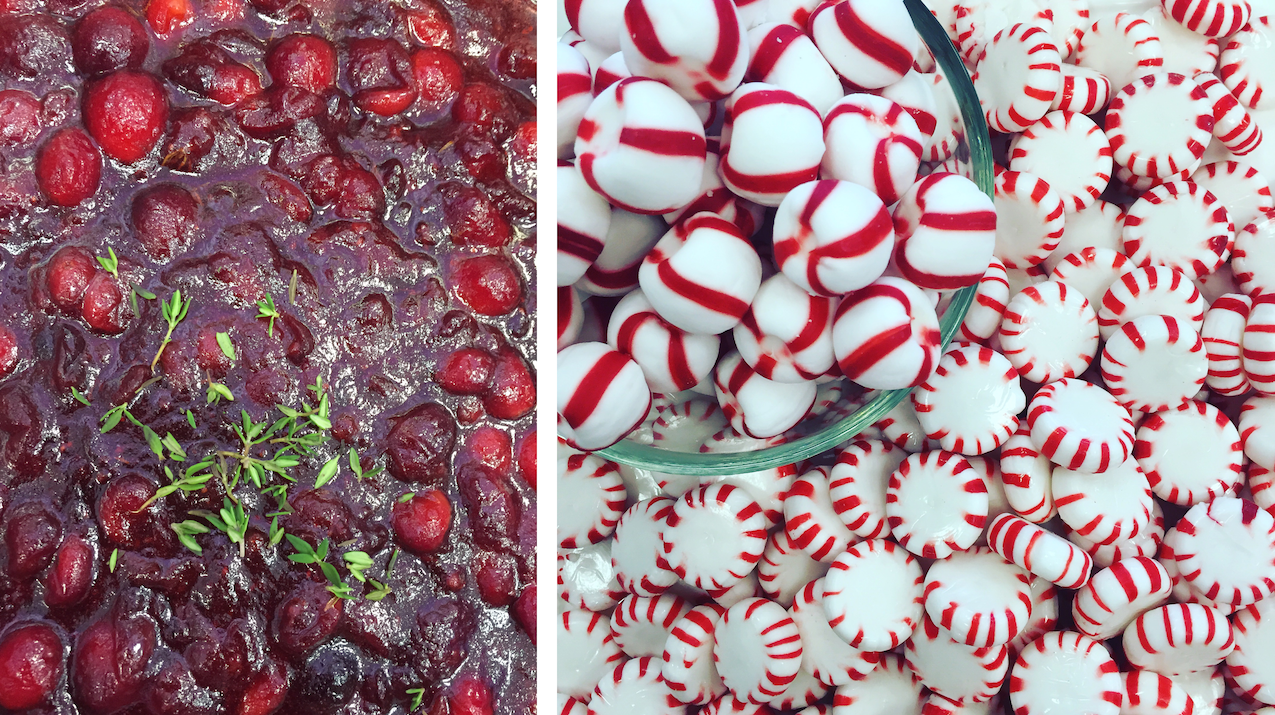
So the way we do things takes more time, but it also keeps you in touch with your ingredients. You respect them a little more because you’re putting a lot of work into it versus someone who’s just kind of pulsing everything in equipment or buying ready-made pastes. When we say “made by hand,” we mean made from the ground up.
Aside from all of the cooking, you also handle a lot of the business side. What are your responsibilities, and how did you learn to be a baller businesswoman?
I manage the front of the business—the face of it. I do all of the social media stuff. Last winter, I set up our website, which is kind of simple because I’m not tech-savvy, but we have a functioning website! We own the domain because I figured that out. I pay the bills, write checks, and go to the bank. I make ice cream. All of the cakes, I do start to finish—that’s all me. I interview, hire, fire, and manage our employees, who are all teenagers. That involves learning the fine line of being friendly with your employees while still actually supervising them. I clean toilets, mop, sweep—all of it. You learn a lot of handy things, too, to avoid calling the handyman all of the time.
You just learn it all because you have to. I’m sure there are books on how to manage a small business or be a better boss or this or that, but ultimately, you get thrown into the fire and you’re either going to figure it out or you’re not.
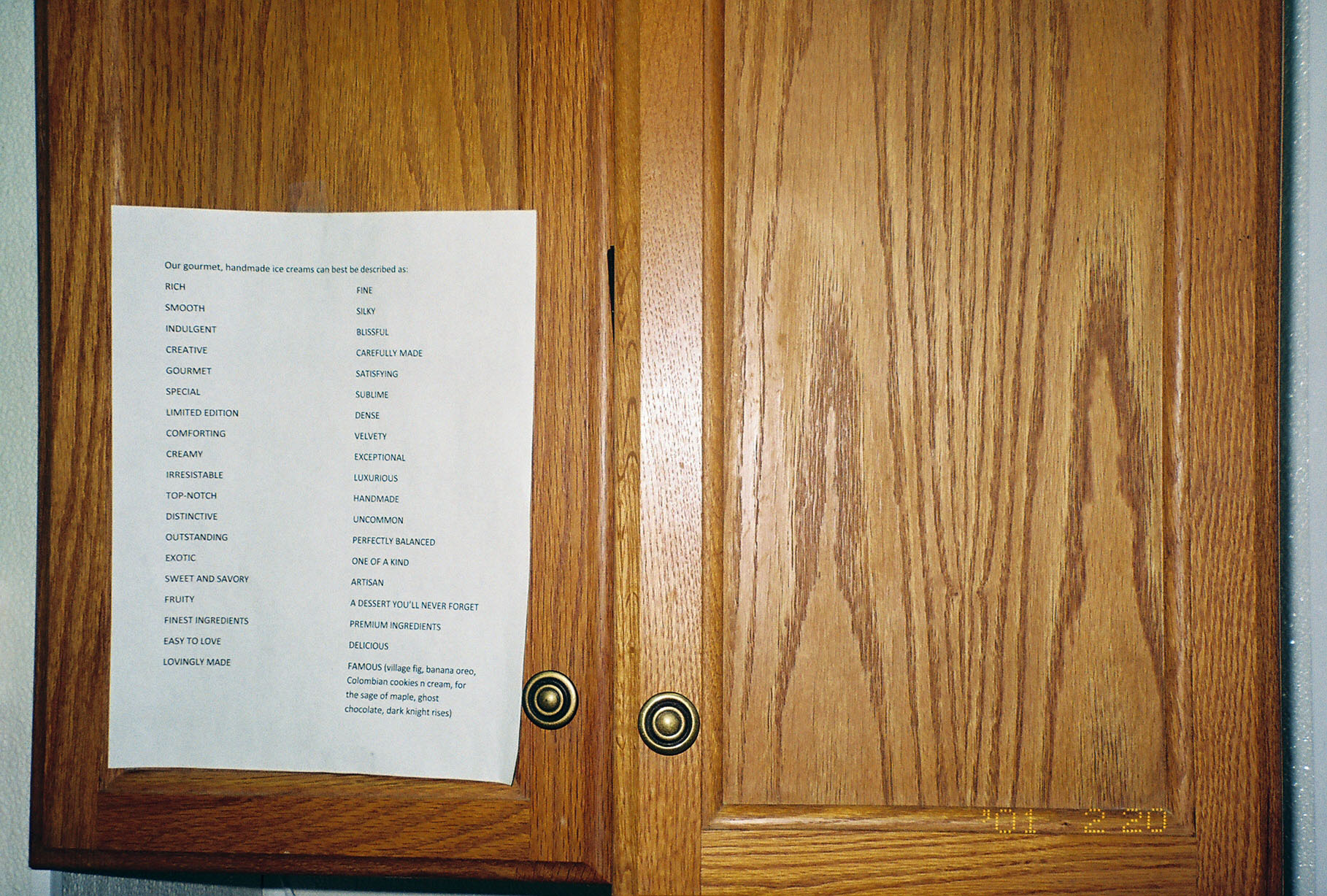
How does it feel to be the “first boss” to your teenage employees?
I will never forget my first boss—she was evil! Sheila at the A&P. My first job was eleven years ago, and I still remember that evil woman’s name. It was horrible!
Having that experience, I don’t want these kids to be like, “Oh my god, my first job sucked! I thought it would be fun working in an ice cream shop, and it wasn’t.” Of course there are days when I might have to be a little firmer with them because it’s my business, and I need to be sure that my standards are always met, but I’m always cognizant of the fact that these are kids, and they’re also my customers. I want them to keep coming back.
What did you learn about being a business owner that may have changed you?
I learned that you have to be really open-minded and listen to people and reserve judgment. I’ve turned from being a “no” person to a “yes” person. My favorite word is still “no,” I just don’t say it as much. [Laughs] One thing I learned in Atlanta when I was working at that restaurant was, “The answer is yes, now what’s the question?” I teach my kids that. The answer is always “yes.” Now how can we make it happen for them? My guidelines for the kids are really notes for myself that I need to work on.
I’ve learned to be happy to be here everyday, because I am, and at the end of the day, I want people to come back. I don’t want my mood to get in the way of them enjoying the ice cream that I make so lovingly. I really do like making it and seeing people be happy. It’s just sometimes their obvious questions or off-the-wall requests piss me off, and I have to be patient. [Laughs]
To open up the shop, you had to move back home—a move that can send a lot of 20-somethings like us into a “what is my life?” emotional spiral, I say from experience. Did that make you feel weird, and how did you get over it?
I’m still getting over it. I do have a lot of resentment built up from being 27 and seeing what other people are doing on social media or whatever. They’re married. They have kids. That part I’m not interested in. But, they’re independent. I like working with my dad—I love working with my dad—but I wish that maybe I didn’t live at home and that I could hang out with my friends or go to a concert on a Friday night and not worry that we’re going to run out of cakes or something. I wish I could have a normal dating life. No one wants to go on a date on a Tuesday, but that’s my night off, so I’m like, “Do you want to get kind of drunk at a bar on a Tuesday night with me? Cause that’s what I like to do!” [Laughs] So yeah, I definitely resent not having a sort of normal late-20s experience, but I’m also aware that this is all going to pay off in a few years, and I should be able to enjoy my life and whatever friends are still around then. [Laughs]
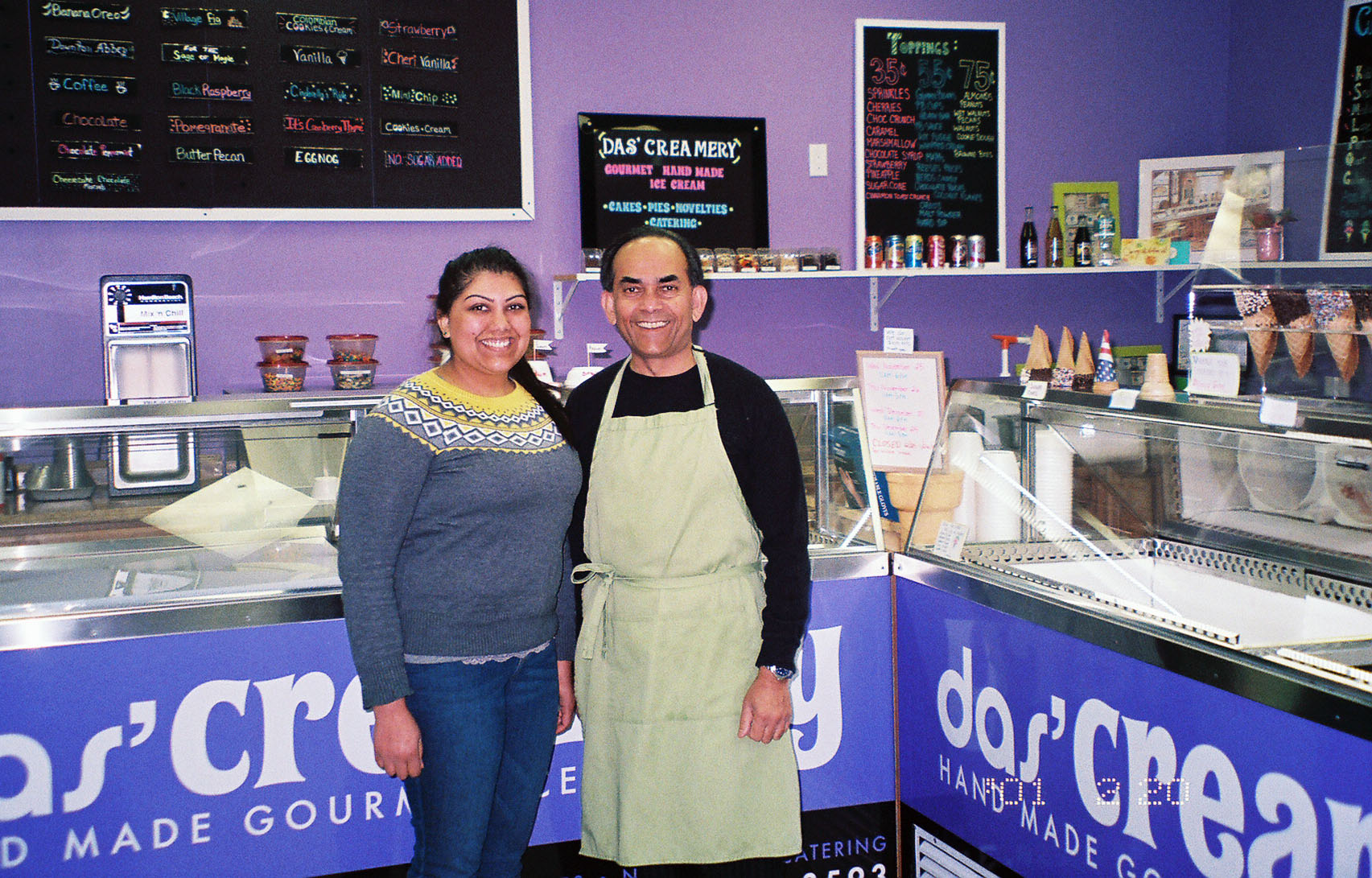
Are you guys where you want to be financially? Are you making money?
Financially, no. If the owners are making money when a small business first starts, there’s a problem. There’s a reason why over 80% of food businesses fail in the first year, and a lot of it has to do with mismanagement of money.
That’s one thing I’ve learned: I will not get paid. I don’t pay myself. If customers tip me in cash, that’s mine—you know, I have to put gas in my car. My car doesn’t run on ice cream. [Laughs] But last year, I made zero dollars. This year, I made only whatever I made in cash tips. Opening a business is not for the faint of heart. If you like flashy things, you’re either going to have to give them up for awhile—meaning one to six years—or don’t open a business. I have no problem buying clothes on sale at Target or Old Navy and wearing them for three years—that’s not a problem for me. I drive a ten year-old Honda Civic, and I’m fine with that. [Laughs] I’m not looking to have a Mercedes or buy a house in the next year or two.
But ice cream can be profitable. It’s proven—many places have done it in the area and nationally, as well. The store pays for itself and the employees. But it’s really difficult to say, even after one year, because nothing is certain. In India, they say that after 1,000 days, which is roughly three years, you can decide whether or not you’re in the red or the black.

Was there ever a moment when you hit bottom or were filled with self-doubt on your path to where you are, and how did you get over that moment?
Earlier this year, we had, like, three nights in a row of bad reviews on Yelp or Facebook or probably all of the above. Three days in a row of really pissed-off people—not like unhappy or disappointed…angry people, irate people. I was like, “Wow. We can’t have weeks like this where every day someone is pissed off…because of ice cream.” That week I was very panicky. If someone wants something you don’t have, and you just got a bad review, you’re like, “Oh god, I hope they don’t review that!” It just takes one bad review to set your anxiety a-twitter.
But then it was fine. Regulars and familiar faces come in, and that boosts your confidence a bit, and you let go. Three bad reviews or three angry people don’t sink a business. That’s not going to put us under. There are always going to be haters.
What are you planning to do with the shop next?
Next year will be our third summer, and I will probably be doing cakes full-time and training employees. Right now, I’m drowning in cake orders! That’s what I did a lot this year, but I was also in the trenches with our employees. On a Friday night, when we have a line out the door, I’m scooping ice cream, just like the 16 year-olds on either side of me. Which is fine. As the owner, people should see you working. If you’re not working harder than your employees, there’s something wrong.
You always have to think about the next big step, and for us, that’ll be expansion, maybe four or five years from now. We can’t just stay in this corner in Budd Lake forever. Our ice cream is just too good. [Laughs] New Jersey is the most densely populated state, so more people should be eating our ice cream—absolutely. [Laughs]
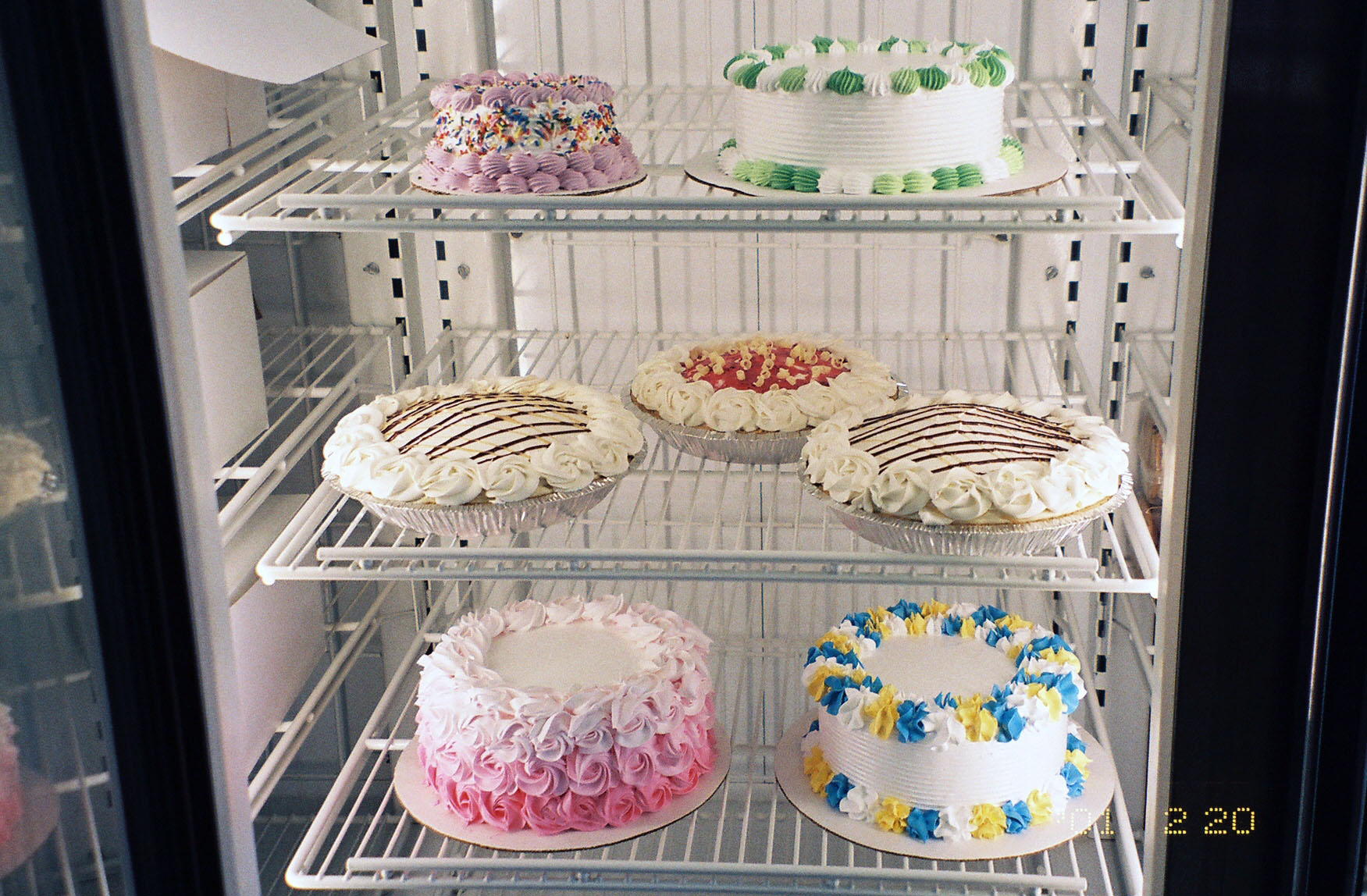
Do you consider yourself successful, and how do you define success?
Yes. I guess success can be measured on a spectrum, and I’m in the infant stages of it. I would consider myself successful because I’m already doing something that I love, while other people may wait until they retire to start something that they really love, after already working for the man for 30 years or more. Every day I feel successful because people come in, and they’re totally floored by the flavors we have. When people appreciate what you do and tell you, it makes you feel good!
I would define success as being able to do what you love, while still taking care of the other things you’re supposed to be responsible for, like your bills and your family. Especially when you consider that not everyone gets the chance to do something that they love. I’m really lucky that my dad wanted to do this, and that he lets me kind of take the reins for most of it because one day it will be mine, so…that’s pretty sweet! Something to look forward to. [Laughs] Also a little bit scary! A lot scary, oh my god!
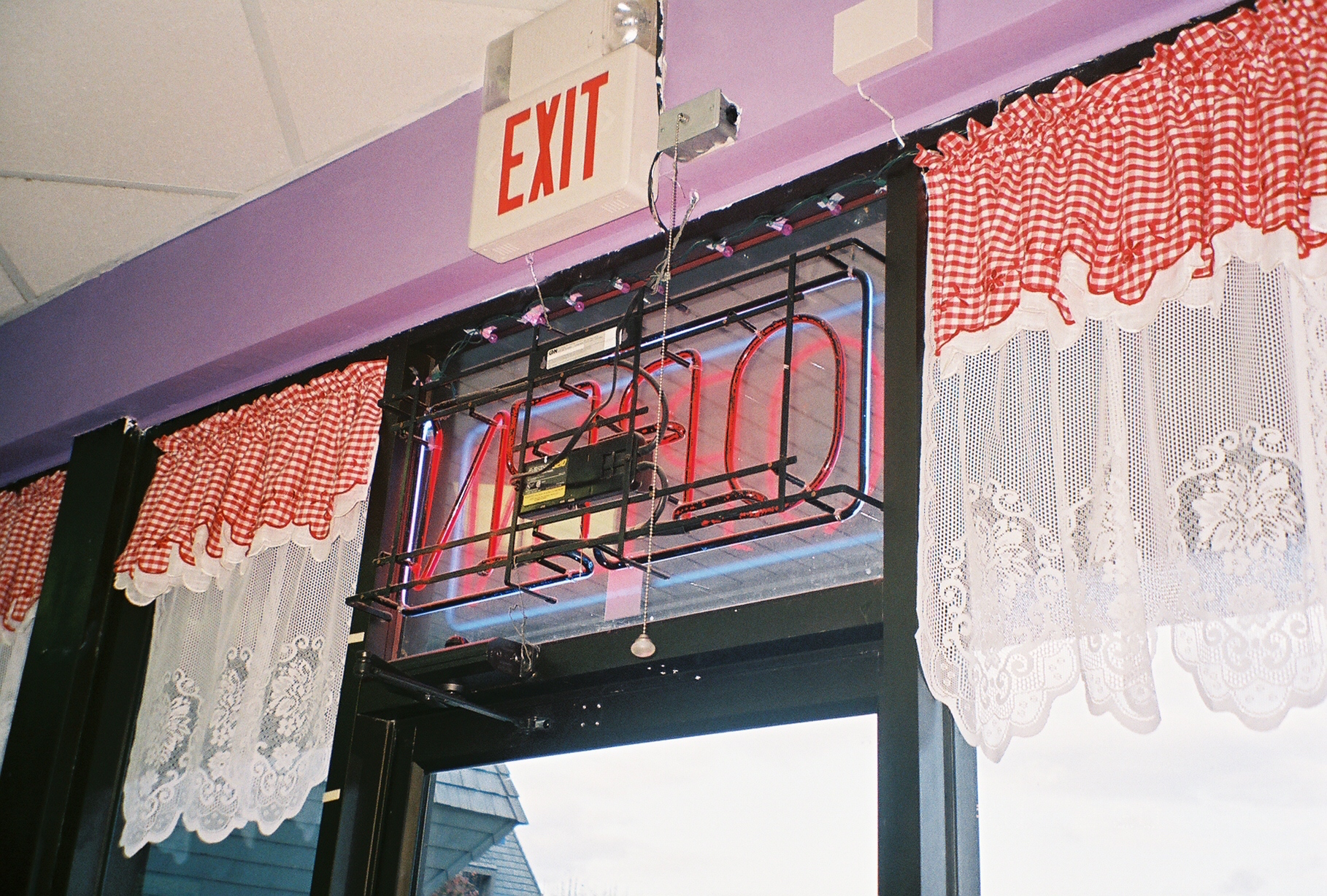
You’re building an empire! Talk to me about that balance between being excited by and scared of the long-term commitment of building a business.
Yeah, that’s the idea: to build an empire that will last generations. I hope “Das” is name that everyone knows far and wide someday, but you have to start small. Some days, I’m like, “Let’s take over the world with our ice cream!” Other times, I’m like, “Let’s just focus on Morris County, I guess.” [Laughs] “Let’s see if the people down the road have had our ice cream yet.” I’m not always a patient person. I want us to explode, but also I think we wouldn’t be ready if we just blew up next year. It’s a learning process, and hopefully everyone just grows with us.
It’s daunting, too. One of the things that keeps me going is closing for a month each year, which my dad’s not crazy about. It’s just one of those small things that helps break it up. So in 25 years, I still want to be here, but right now, I’m just focused on getting through the next month. I guess it’s the same if someone wants to lose 100 pounds. You can’t focus on that big number, you have to just focus on the first ten pounds or one pant size and go from there. [Laughs] Although also, I’m struggling with that, owning an ice cream shop. [Laughs]
You can find out more about Das Creamery on their website and follow Komal’s ice cream creations on Facebook and Instagram.


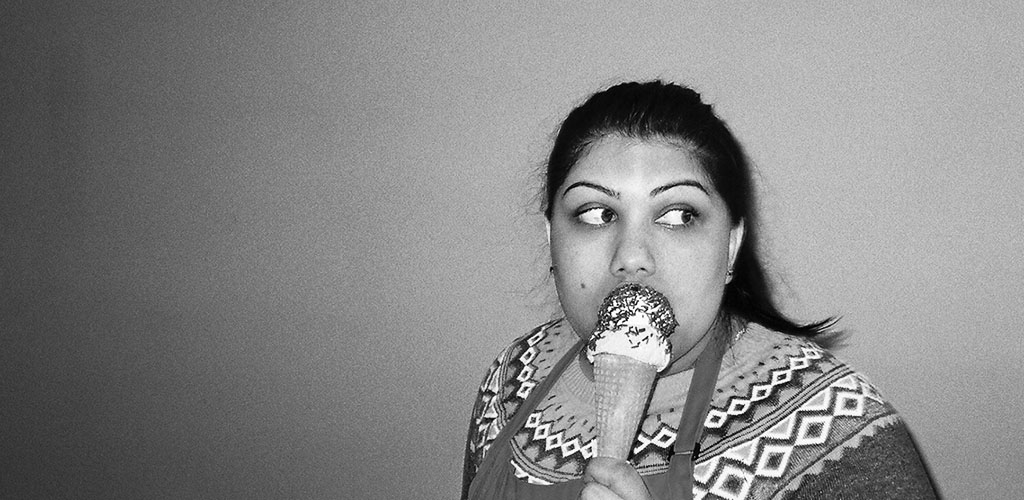
Mary
Posted at 21:11h, 01 DecemberThis is amazing, Komal! I have to get out there before the 22nd. Are those ice cream pies in the photo? lord jesus, yes please! Awesome article.
Samir Shah
Posted at 16:23h, 17 MarchIt is amazing.